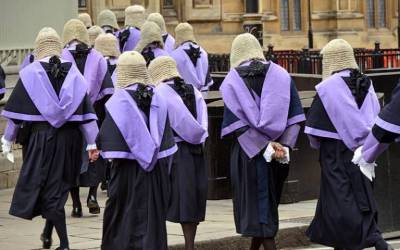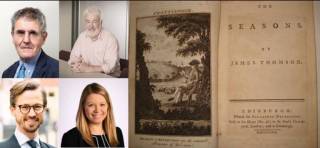Find out more about the events that we held in 2024
Copyright and Generative AI: Putting input issues under the spotlight
20 March 2024

Generative AI, as a topic, is everywhere. From a copyright law perspective, much attention has been directed towards whether the outputs of generative AI do, or should, enjoy copyright protection. While the output and input issues are inevitably linked, the focus has firmly shifted to the legal implications of the process involved in training these systems. Generative AI systems are reliant upon huge datasets of existing materials, whether text, music or artwork – often copyright-protected works – and typically harvested without the copyright holders’ knowledge or permission. Is this training activity plain infringement, or a permitted use which should be exempted?
Litigation is on foot in numerous jurisdictions, and these ongoing disputes may provide some much-needed answers in 2024. At the same time, many IP Offices around the world are engaged in stakeholder consultations, striving to find the ‘right’ balance of copyright protection which respects the rights and interests of human creators while not dampening innovation in the burgeoning AI sector. This event delved into the fascinating world of Generative AI to paint a clearer picture of the specific copyright challenges that this rapidly evolving technological landscape presents, and explore the role that copyright law should play in mediating between the AI technologists and the creative industries.
Chair: Professor Tania Aplin (Kings College London)
- Dr Ana Ramalho, Copyright Counsel at Google
- Dr João Pedro Quintais, Assistant Professor at IViR (Institute for Information Law), University of Amsterdam
- Toby Headdon, Bristows LLP.
Find out more about the event here, or or watch the Lecture here on our YouTube channel.
AI-Enabled Crime - The Annual Privacy Lecture
19 March 2024

About the talk
Defending against cyber attacks is a never-ending race. Generative AI is changing cybercrime in the form of deepfakes, automated phishing at scale and region-free scams. Next, we're likely to see fully automated malware campaigns, using machine learning. Most cyber security systems already heavily use AI. Once the attackers migrate to AI, attack and defense online will become a game of a robot against a robot. What have we seen so far? And what's going to happen next?
About the speaker
Mikko Hyppönen is one of the most recognized cyber security experts world-wide, a TED speaker and a best-selling author. Mikko works as the Chief Research Officer for WithSecure in Finland and sits on the advisory boards of EUROPOL and Verge Motorcycles. He has written for the New York Times, Wired and Scientific American, and his latest book has been translated to 5 languages.
Find out more about the event here, or watch the Lecture here on our YouTube channel.
Question the Trade Mark Judges
15 March 2024

IBIL and MARQUES, the European Association of Trade Mark Owners, invited you to meet and question some of the judges that are deciding our trade mark disputes. The Chair, The Rt Hon Professor Sir Robin Jacob, posed a set of pre-selected questions from the audience to:
- Virginia Melgar – Chairperson of the 5th Board of Appeal, EUIPO
- The Honourable Mr Justice Mellor – High Court
- Douglas Campbell KC - Deputy High Court Judge, Civil Recorder and Crime Recorder on the South Eastern Circuit
- Allan James - Senior Hearing Officer and former Head of Trade Mark Tribunal, UKIPO.
Find out more about the event here, read the MARQUES event report here, or watch the Lecture here on our YouTube channel.
The Battle of the Booksellers: the 250th anniversary of Donaldson v Beckett
27 February 2024

About this talk
The Stationers’ Company played a pivotal role in the enactment of the world’s first copyright legislation in 1710 which is known simply as ‘the Statute of Anne’. Yet, the case of Donaldson v Beckett (1774) was a significant landmark in the protection of literary works and equally deserving of attention as we reach its 250th anniversary in February 2024.
Although the new copyright act provided a monopoly for up to 28 years, London’s publishers then faced unwelcome competition from Scottish printers, whose trade was largely built upon the re-printing English books, once the statutory protection expired. A thirty-year campaign of litigation ensued – the ‘Battle of the Booksellers’. The London publishers seemed to have triumphed. They persuaded the English courts that the fixed term protection of the Statue of Anne merely supplemented the perpetual ‘common law’ protection that a first publisher already enjoyed. The copyright legislation could have become an irrelevance, but then Donaldson v Beckett turned the tide.
Following a hearing in February 1774, the House of Lords ruled that a Scottish printer, Alexander Donaldson, was entitled to print James Thomson’s The Seasons without requiring Beckett’s permission. The Lords put paid to any notion of ‘common law’ rights in published works. In doing so, they not only underlined that copyright protection is entirely a creature of statute but reminded that its rationale was not to further the commercial interests of publishers (or even authors) but to reflect broader societal goals, such as the ‘encouragement of learning’.
Now, 250 years later, have these lesson been forgotten? The term and scope of copyright protect seems to increase with each new piece of legislation. Have we returned to 'perpetual' copyright again in all but name? While the battles between booksellers may now be confined to history, the debate as to the proper balance between copyright holders and users is far from over. Technological developments continue to place the current law under strain. As the UKIPO consults on how much unauthorised 'text and data mining' copyright holders must tolerate, AI is only one in a long line of threats that now publishers face.
To mark the historic anniversary of Donaldson v Beckett, the UCL Institute of Brand and Innovation Law joined forces with The Worshipful Company of Stationers and Newspaper Makers (‘The Stationers’ Company’) to assemble a distinguished panel to reflect on Donaldson, its aftermath and debate how much, or perhaps how little, the copyright challenges for publishers have changed.
The Speakers
Welcome: Tony Mash, Master Stationer
Panel: Professor Hector MacQueen CBE (University of Edinburgh); Catriona MacLeod Stevenson (Publishers Association); and Jaani Riordan (Stationer and a barrister at 8 New Square Chambers)
Chair: Professor Sir Robin Jacob (UCL IBIL)
Find out more about the event here, or watch the Lecture here on our YouTube channel.
Thinking Clearly about Trade Mark Clutter
7 February 2024

About this talk
The number of trade mark applications filed each year remains on an upward curve. Once registered, trade marks can stay on the register indefinitely, providing the renewal fees are paid. While some marks will be revoked and others will expire, the rate of removal of marks will never keep pace with new registrations, so the stock of registered marks keeps growing year on year. The trade mark registers around the world are becoming cluttered.
Few contest that trade mark cluttering undermines the effectiveness of a trade mark registration system, but gauging the true nature and impact of clutter is challenging. And even if there is a problem, it is unclear what measures can be put in place to tackle the issue effectively. Has the system swung the balance too far in favour of applicants and owners? Are registry fee structures and practices unwittingly encouraging applicants to frame their applications too broadly and for more goods and services than they really need? The UK Supreme Court’s long awaited decision in SkyKick UK Ltd v Sky Ltd will have the final say of when and to what extent that filing an application with an overbroad specification of goods and services is made in ‘bad faith’.
The Speakers
- Alicia Chantrey, Associate General Counsel, Intellectual Property – Associated British Foods plc
- Professor Dev Gangjee, University of Oxford
- Dr Georg von Graevenitz, Queen Mary, University of London
- Andy Bartlett - Deputy CEO and Director of Services, UK Intellectual Property Office
Chair: Daniel Alexander KC
Find out more about the event here, or watch the Lecture here on our YouTube channel.
Are you Ready for REULA?
22 January 2024

About this talk
The Retained EU Law (Revocation and Reform) Act 2023 (REULA) received Royal Assent in June 2023 and will enter into force on 1 January 2024. While original plans for a post-Brexit ‘bonfire of EU laws’ were abandoned, the new Act still abolishes certain now-familiar principles of EU law and introduces provisions intended to make it easier for UK courts to depart from retained EU case law (now re-branded as ‘assimilated law’). While many thousands of pieces of legislation have been saved from the end of year bonfire, the Government clearly sees REULA as the catalyst for future regulatory departure from EU laws.
This conscious uncoupling of UK and EU laws introduces uncertainty in a number of areas, including in relation to intellectual property law, which for so long have been the focus of EU harmonising efforts. Of course, with legislative uncertainty comes the risk of increased litigation, but also, perhaps, offers the UK courts and legislature a welcome opportunity to ditch aspects which just weren’t working for the UK’s IP stakeholders.
In this event, our distinguished panel will summarise the key provisions in REULA, highlight its potential implications for the main IP rights, and review the main opportunities for law reform in this area.
The Speakers
- Dr Ruth Fox, Director of the Hansard Society
- Professor Phillip Johnson, University of Cardiff, Barrister, Appointed Person
- Nina O’Sullivan, Mishcon de Reya LLP
- His Honour Judge James Tindal, Specialist Civil Circuit Judge, Birmingham CJC
Chair: The Rt Hon. Sir Richard Arnold, Lord Justice of Appeal
Find out more about the event here, or watch the Lecture here on our YouTube channel.
 Close
Close

